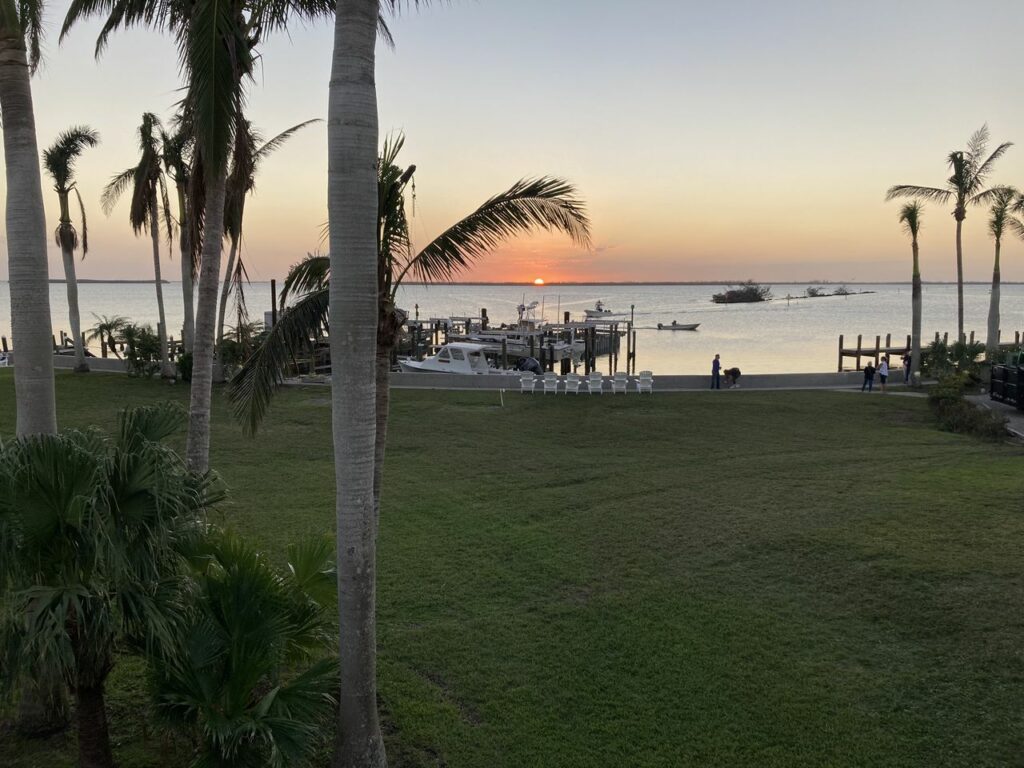
The pool at sunset at Tarpon Lodge, an old-Florida retreat on Pine Island in Southwest Florida.
PINE ISLAND, Florida – There are no sandy beaches on this Florida island, no high-rise condo complexes, no fancy stores.
What you’ll find instead on Pine Island, just west of Fort Myers: a mostly rural atmosphere with exotic fruit farms and some of the best fishing in the state.
There’s also a unique old Florida place to spend the night, the Tarpon Lodge, with 22 overnight rooms and cottages, many with views of the Pine Island Sound.
The property was vacant when the Wells family purchased it in the late 1990s. Built in the 1920s as a fishing retreat, the property was reincarnated in the 1950s for the American Bible College and then turned into a rehab center for drug and alcohol addiction in the 1980s.
The Wells family, who also own the nearby retreat on Cabbage Key, returned the lodge to its roots.
“My dad is an avid fisherman,” said Robert Wells, general manager of the lodge. “We opened this as a throwback fishing lodge. Then we realized that people sought it out for other reasons.”
Indeed, the place works as a relaxing retreat even if you’ve never held a fishing pole in your life, with lush tropical grounds, gorgeous sunsets, a terrific restaurant and live music on many nights.
Wells, however, believes that getting out on the water is essential to the Tarpon Lodge experience, whether paddling a kayak around the sound or taking a quick boat ride to nearby Boca Grande.
“If we get them all the way out here and we don’t get them out on the water, we consider that a failure,” said Wells.
The adjacent Pineland Marina offers scheduled and charter boat trips to nearby islands, including Cabbage Key, 5 miles as the crow flies. The 80-acre island offers overnight accommodations, a restaurant and the famous Dollar-Bill Bar, where visitors sign singles before taping them to the wall.
Rob Wells’ parents bought Cabbage Key in 1976 and have run the popular overnight retreat for nearly a half-century. It’s where he and his brother grew up, traveling by boat to the mainland for school.
Neither Cabbage Key nor Tarpon Lodge sustained the kind of damage from Hurricane Ian that properties on nearby Sanibel and Captiva did, according to Wells. Unlike Sanibel and Captiva, which are barrier islands made of sand, Pine Island is made of coral rock like the mainland.
Hurricane Charley, which hit Southwest Florida in 2004, was more destructive here, he said. Even so, Tarpon Lodge was flooded after Ian, and parts of the marina were destroyed.
“Damage is a relative term,” he said.
The property reopened less than a month after the storm. “We really love the idea of fighting fast to get reopened,” he said. “A lot of people in the neighborhood appreciate it. They need a little normalcy too.”
Tarpon Lodge’s restaurant is open daily for lunch and dinner, with seafood – as you would expect – taking a starring role on the menu.
Overnight rooms start at about $200.
Access to Tarpon Lodge – if you’re not boating here – is via the Matlacha Pass Bridge, which connects Pine Island to the mainland at Cape Coral. The bridge, broken apart by Ian, was repaired and reopened in less than a week.
En route to Pine Island is the town of Matlacha, a fishing village turned artist community, which was devastated by the storm. You’ll see the damage firsthand from the bridge as you’re passing through on the way to Tarpon Lodge, which is located on the northwest coast of 17-mile-long Pine Island.
A handful of businesses in Matlacha have reopened, including the Perfect Cup coffee shop, which makes a nice stop on the way.




